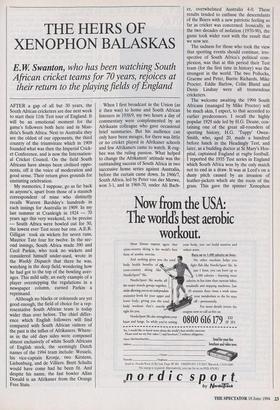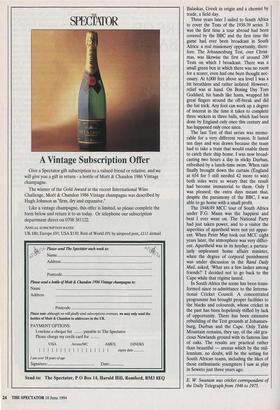THE HEIRS OF XENOPHON BALASKAS
E.W. Swanton, who has been watching South
African cricket teams for 70 years, rejoices at their return to the playing fields of England
AN"1'ER a gap of all but 30 years, the South African cricketers are due next week to start their 11th Test tour of England. It will be an emotional moment for the game's followers both here and in Man- dela's South Africa. Next to Australia they are the oldest of our opponents, the third country of the triumvirate which in 1909 founded what was then the Imperial Crick- et Conference, and is now the Internation- al Cricket Council. On the field South Africans have always been civilised oppo- nents, off it the voice of moderation and good sense. Their return gives grounds for unstinting celebration.
My memories, I suppose, go as far back as anyone's, apart from those of a staunch correspondent of mine who distinctly recalls Warren Bardsley's hundreds in each innings for Australia in 1909. In my last summer at Cranleigh in 1924 — 70 years ago this very weekend, to be precise — South Africa were bowled out for 30, the lowest ever Test score bar one. A.E.R. Gilligan took six wickets for seven runs, Maurice Tate four for twelve. In the sec- ond innings, South Africa made 390 and Cecil Parkin, who took no wickets and considered himself under-used, wrote in the Weekly Dispatch that there he was, watching in the deep field, wondering how he had got to the top of the bowling aver- ages. This mild sally, an early example of a player overstepping the regulations in a newspaper column, earned Parkin a reprimand.
Although no blacks or coloureds are yet good enough, the field of choice for a rep- resentative South African team is today wider than ever before. The chief differ- ence which English followers will find compared with South African visitors of the past is the influx of Afrikaners. Where- as in the old days sides were composed almost exclusively of white South Africans of English stock, the seemingly Dutch names of the 1994 team include: Wessels, his vice-captain Kronje, two Kirstens, Liebenburg, and de Villiers. Brett Schultz would have come had he been fit. And despite his name, the fast bowler Allan Donald is an Afrikaner from the Orange Free State. When I first broadcast in the Union (as it then was) to home and South African listeners in 1938/9, my two hours a day of commentary were complemented by an Afrikaans colleague who gave occasional brief summaries. But his audience can only have been meagre, for there was little or no cricket played in Afrikaner schools and few Afrikaners came to watch. R-rug- bee was the ruling passion. What helped to change the Afrikaners' attitude was the outstanding success of South Africa in two successive home series against Australia, before the curtain came down. In 1966/7, South Africa, led by Peter van der Merwe, won 3-1, and in 1969-70, under All Bach- er, overwhelmed Australia 4-0. These results tended to enthuse the descendants of the Boers with a new patriotic feeling so far as cricket was concerned. Ironically, in the two decades of isolation (1970-90), the game took wider root with the result that we now see.
The sadness for those who took the view that sporting events should continue, irre- spective of South Africa's political com- plexion, was that at this period their Test team (for the first time in history) was the strongest in the world. The two Pollocks, Graeme and Peter, Barrie Richards, Mike Procter, Eddie Barlow, Colin Bland and Denis Lindsay were all tremendous cricketers.
The welcome awaiting the 1994 South Africans (managed by Mike Procter) will be much akin, I expect, to that accorded to earlier predecessors. I recall the highly popular 1929 side led by H.G. Deane, con- taining one of the great all-rounders of sporting history, H.G. `Tuppy' Owen- Smith, who, aged 20, made a hundred before lunch in the Headingly Test, and later, as a budding doctor at St Mary's Hos- pital, captained England at rugby football. I reported the 1935 Test series in England which South Africa won by the only match not to end in a draw. It was at Lord's on a dusty pitch caused by an invasion of leather-jackets which ate the roots of the grass. This gave the spinner Xenophon Balaskas, Greek in origin and a chemist by trade, a field day.
Three years later I sailed to South Africa to cover the Tests of the 1938-39 series. It was the first time a tour abroad had been covered by the BBC and the first time the game had ever been broadcast in South Africa: a real missionary opportunity, there- fore. The Johannesburg Test, over Christ- mas, was likewise the first of around 200 Tests on which I broadcast. There was a small green box in which there was no room for a scorer, even had one been thought nec- essary. At 6,000 feet above sea level I was a bit breathless and rather isolated. However, relief was at hand. On Boxing Day Tom Goddard, his hands like hams, wrapped his great fingers around the off-break and did the hat trick. Any fool can work up a degree of interest in the time it takes to complete three wickets in three balls, which had been done by England only once this century and has happened only once since.
The last Test of that series was memo- rable for a very different reason. It lasted ten days and was drawn because the team had to take a train that would enable them to catch their ship home. I was now broad- casting two hours a day in sticky Durban, refreshed by a lunch-time swim. When rain finally brought down the curtain (England at 654 for 5 still needed 42 more to win) both sides were so weary that the result had become immaterial to them. Only I was pleased; the extra days meant that, despite the parsimony of the BBC, I was able to go home with a small profit.
The 1948/49 MCC tour of South Africa under F.G. Mann was the happiest and best I ever went on. The National Party had just taken power, and to a visitor the asperities of apartheid were not yet appar- ent. When Peter May took out MCC eight years later, the atmosphere was very differ- ent. Apartheid was in its heyday; a particu- larly unpleasant home affairs minister, when the degree of corporal punishment was under discussion in the Rand Daily Mail, asked, 'What are a few lashes among friends?' I decided not to go back to the Cape while that regime lasted.
In South Africa the scene has been trans- formed since re-admittance to the Interna- tional Cricket Council. A concentrated programme has brought proper facilities to the blacks and coloureds, whose cricket in the past has been hopelessly stifled by lack of opportunity. There has been extensive rebuilding of the Test grounds at Johannes- burg, Durban and the Cape. Only Table Mountain remains, they say, of the old gra- cious Newlands ground with its famous line of oaks. The results are practical rather than beautiful — arenas which by the mil- lennium, no doubt, will be the setting for South African teams, including the likes of those enthusiastic youngsters I saw at play in Soweto just three years ago.
E. W. Swanton was cricket correspondent of the Daily Telegraph from 1946 to 1975.



























































 Previous page
Previous page